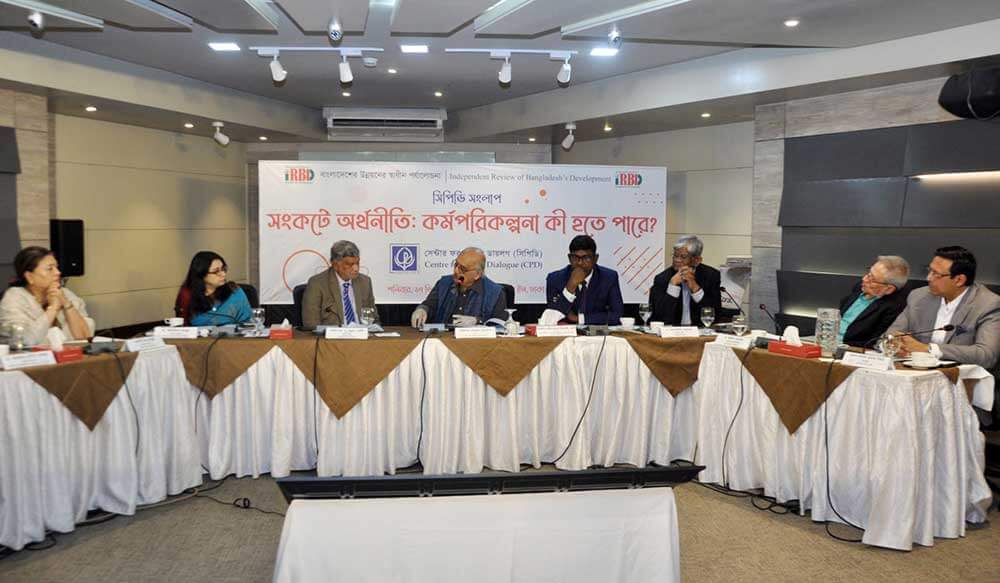
The economy of Bangladesh is currently facing a number of longstanding structural weaknesses. Several external factors including the COVID-19 pandemic, the Russia-Ukraine war and consequent supply chain disruptions have exacerbated the weaknesses. Indeed, macroeconomic management has never seen such a difficult phase in recent history. Proper policy actions are a need of the hour in terms of commodity prices, external sector management, power and energy sector, banking sector, and fiscal balance to manage the ongoing economic crisis.
In the above context, the Centre for Policy Dialogue (CPD) under its flagship programme Independent Review of Bangladesh Development (IRBD) organised a dialogue on “Economic Crisis: What should be the action plan?” on Saturday, 17 December 2022.
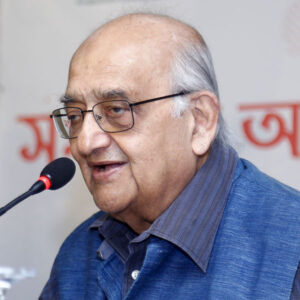
Professor Rehman Sobhan, Chairman, CPD, and Former Member, Advisory Council of the Caretaker Government, chaired the session. Professor Sobhan said that the current conversation is designed to identify the reasons why the problems are persisting and what can be done about it. He added, “The government is making heroic efforts to deal with the ongoing economic crisis, and they need all the help that they can get.” He urged the government to recognise positive recommendations and incorporate them in their policies so that the country can achieve economic sustainability. He compared the situation to ‘lotus flower’ syndrome. Some variants of lotus fully bloom at a particular time of the year, and remains closed for the rest of the year. Thus, the persisting problems are being treated like lotus flower, and the current issues will perhaps be suppressed later. Professor Sobhan added that the purpose of the IRBD is not to critique government policy but to enable public discussion of policy by stakeholders. IRBD works to present recommendations which will be helpful to the policy-making process essentially aiming at a collaboration between the state and civil society. He called for a full transparency as regards implementation process of infrastructure projects and cost overrun issues.
The dialogue was moderated by Dr Fahmida Khatun, Executive Director of CPD. In her keynote presentation, Dr Fahmida said that policy actions are required to curb inflation; to tackle the emerging challenges in external sector, energy and power sector, banking sector; and to maintain a fiscal balance.
Summary of the presentation
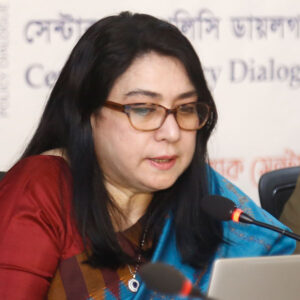
In light of rising inflation, CPD recommended that a new consumption basket should be formulated for calculating CPI inflation. The National Board of Revenue (NBR) should consider removing the advance income tax (AIT), advance tax (AT) and regulatory duty (RD) on imported essential food items. The Bangladesh Competition Commission should adopt a strong stance against cartels and a zero-tolerance policy towards collusive practices. The Minimum Wage Board should consider increasing the minimum wages in all industries so that workers earning minimum wages may at least afford basic foods.
For the external sector, servicing of foreign debt could add new dimensions to the emerging challenges in connection with reserves management, particularly against the backdrop of maturing of some of the hard term loans of the recent past. The growing private sector foreign loan, while not backed by sovereign guarantee but by bank guarantee, has added a new dimension to the debt discourse. The demand for foreign currency will rise, with consequent ramifications for exchange rate movements. This should be factored into the country’s exchange rate management.
The depreciation of BDT will have important implications for debt servicing, both public and private, particularly for loans taken to underwrite projects that generate revenue in local currency. Both liabilities and returns should be re-estimated in view of this, and business plans need to be re-visited, to ensure proper debt servicing.
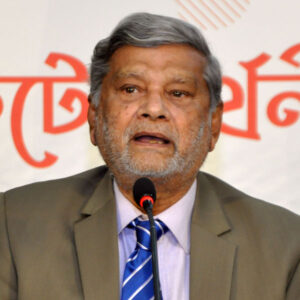
The International Monetary Fund (IMF) has come up with a number of suggestions as regards exchange rate management, monetary sector management, and data transparency. Many of these suggestions call for serious attention as well as urgent decision by policymakers and these have been pointed out by experts for quite some time now. Subsequent reforms and measures must be subject to open and transparent debates and discussions, taking cognisance of both short-term needs and medium- to long-term strategic interests of the country.
In the energy and power sector, a clean energy scenario could be more resource-efficient and would generate more power and save subsidy allocation. LNG-based power generation should not be encouraged further and gas exploration should be prioritised. Fossil fuel-based power plants which are in the process of retirement should not be extended further under the Quick Enhancement of Electricity and Energy Supply (Special Provision) Act 2010.
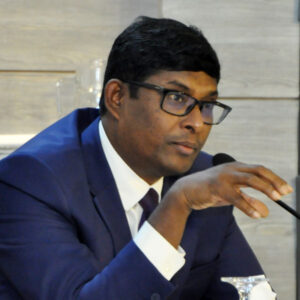
In case of the banking sector, comprehensive reforms of the banking sector are required that would strengthen commercial banks, empower the central bank, create a conducive legal environment, and ensure data availability. A goal-specific, time-bound, inclusive, transparent, unbiased and independent Citizen’s Commission on Banking should be set up in order to bring transparency in the prevailing situation, identify the root causes of the manifested problems, and suggest credible measures for improving the situation sustainably.
In view of the current trends in fiscal balance and likely scenario in the foreseeable future concerning public finance management, CPD recommended to prioritise ADP projects, ensure subsidy management in favour of the marginalised groups, and synchronise budget deficit financing with monetary policy. Various policy efforts are called to curb tax evasion and illicit financial flows, revisit tax incentives and take steps to review the costing of public investment projects.

In view of the ongoing economic crisis, CPD recommended that policymakers need to make stringent policy decisions for improved macroeconomic management and economic governance. For macroeconomic management, a free-floating exchange rate should be pursued instead of managing exchange rate. Interest rate caps on both deposit and lending should be withdrawn for all cases to install market-based mechanism for interest rate management. The national budget should be revisited with a view to revising the targets of domestic resource mobilisation, prioritising public expenditure and strategising deficit financing.
Good governance in the banking sector should be established and necessary reforms should be initiated. Public procurement deals should be revisited to guarantee that public interest is upheld for overall economic governance. The costing of public investment projects should be reviewed to ensure good value for money. Market monitoring to safeguard the interests of the consumers should be strengthened.
Comments by guests
Mr M. A. Manan, MP, Hon’ble Minister, Ministry of Planning, Government of Bangladesh, graced the dialogue as the Chief Guest. He said that the situation in Bangladesh has improved a lot over the past few decades. Inflation has been decreasing to some level and the minimum wage has been increasing too. These improvements should be highlighted and appreciated. Moreover, all sorts of data are continuously being disseminated by the government. He urged the citizens to raise their voice regarding any data gap or unavailability to create space for further rectification.

Mr Shameem Haider Patwary, MP, Member, Parliamentary Standing Committee on Ministry of Law, Justice and Parliamentary Affairs, Bangladesh Parliament, was the Special Guest at the session. He opined that several problems would have been solved if there was an inclusive consultation process during policymaking. He said that they listened to recommendations of many civil society members over the last few years, and despite placing the points in the National Parliament, he found the concerned authorities reluctant in accepting those suggestions.
Dr Ahsan Habib Mansur, Executive Director, Policy Research Institute of Bangladesh (PRI), distinguished panelist at the dialogue said, “The capacity of Bangladesh to absorb economic shocks is very low.” He clarified that the government should improvise its strategies and policies to utilise their revenue to increase the capacity of absorbing shocks. He shared his views on resource mobilisation for strengthening the banking sector.
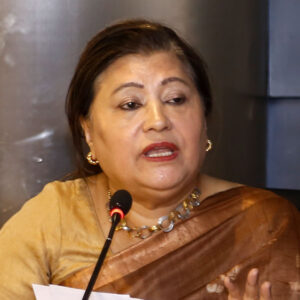
“Workers get deprived of a better living standard despite the increase in minimum wage because the house rents and commodities prices also shoot up upon its increase,” said Dr Zahid Hussain, Former Lead Economist, World Bank Bangladesh. He said that if commodity prices and house rents keep increasing like this, it will aggravate inflation. His discussion also focused on subsidy management, project implementation, and requirement for undertaking reforms.
Ms Rupali Haque Chowdhury, Manging Director, Berger Paints Bangladesh, highlighted the struggles of international businesses and said that they prepare their budget based on the exchange rate. The fluctuation of exchange rate impacts the business operations as most of raw materials for industries are import-based. “Large Multinational organisations are struggling to balance their finances and SMEs are becoming non-existent due to fluctuating exchange rate,” said Ms Rupali.
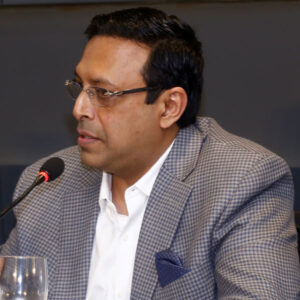
Commenting on the external sector, Mr Mohammad Naser Ezaz Bijoy, Chief Executive Officer (CEO), Standard Chartered Bank (SCB) and President, Foreign Investor’s Chamber of Commerce and Industry (FICCI), put emphasis on export diversification. He said, “The export basket of Vietnam is highly diversified which attracts a plethora of investors, but it is not the same for Bangladesh since its export basket is limited.” He also shed light on the banking sector, interest rate, foreign exchange reserve, and exchange rate.
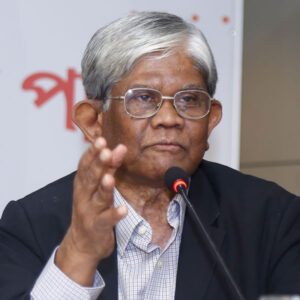
Dr Salehuddin Ahmed, Former Governor, Bangladesh Bank, emphasised that only controlling inflation and the exchange rate will not
be enough. The commodities market needs to be monitored and initiatives need be taken to control market prices so that the rising inflation can be curbed. He suggested for strict discipline in the banking sector through establishing independence of Bangladesh Bank.
In the open floor discussion, participants said that the minimum wage should be increased so that workers can afford a decent standard of living. They highlighted that necessary initiatives should be taken immediately for strengthening the banking sector through restricting the number of banks and reducing loan defaults. The audience also expressed their concerns over the shortage of dollars in the market and weakening capital market. It was suggested by the participants that subsidies should be given to only those who need them, otherwise it would increase inflation further. There was a demand for availability of data on the unemployment rate.

